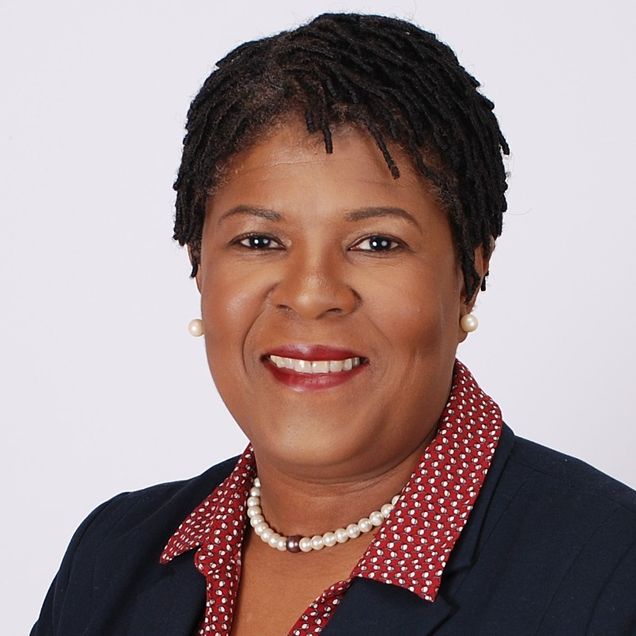GMS Alumni Spotlight: Dr. Ann-Marie Richard
We sat down for a conversation with Dr. Ann-Marie Richard, who received her PhD in Pathology from GMS in 2003. She currently works in Pfizer’s Internal Medicine Division as a Patient Engagement Lead.

Can you tell us a little about your role at Pfizer?
I actually came from being a full-time scientist. I moved from principle scientist to the patient engagement role about three years ago. I always say I’m the bridge between the patients and scientists. The ultimate goal is to be able to understand the diseases that we’re working on from the patients’ perspective.
We build relationships with advocacy groups, and then we speak directly to patients. We try to understand what they experience with their disease and what sorts of outcomes are most important to them. It’s really about understanding the unmet needs from the patient’s perspective, not just what we believe the unmet need is. I take that information back to the scientists, and they ensure that the targets that they are assessing can modulate those sorts of outcomes.
How did you make your way into this role from your education at GMS?
My PhD is in pathology, but I’ve done very little “strict” pathology in my career. I did my dissertation in a metabolic lab with Dr. Keith Tornheim and Dr. Barbara Corkey. A lot of the work that I had done was on diabetes research. Then I went on to Pfizer and I was also in the metabolic disease department, again, primarily working on diabetes.
I was doing that basic science work and drug development for ten years. I got to a point in my career where I didn’t feel as fulfilled as I wanted to be. I loved the science, but I couldn’t quite see the direct impact on the patients. So, I started looking at what sorts of opportunities were out there that would allow me to work more closely with patients. I spoke to people in patient-facing roles to understand what their day-to-day was like and to get a better feel for where I really wanted to go in the next phase of my career. That’s what led me to the decision to go into patient advocacy.
At that time, the entire healthcare industry was becoming more patient-centric and recognizing that patients are really the experts in their disease. My department recognized the value of creating a patient-facing role, which I ended up moving into. Now, all of our scientists are excited about meeting with patients who actually live with the conditions they are working on. It gives a sense of purpose for what they’re doing. Meeting someone you have actually impacted or have the potential to impact makes a huge difference. It makes me want to come to work every day.
Meeting someone you have actually impacted or have the potential to impact makes a huge difference. It makes me want to come to work every day.
What do you see as the impact of the work you’re doing now?
I think the biggest impact is empowering patients to give them that voice in research and the opportunity to educate scientists and clinicians on how to better serve them. From very early stages where we’re doing pre-clinical work, the insight we get from patients allows us to start assessing whether our drug targets the outcomes they need.
For example, let’s say that a patient with a particular condition reports that what’s most burdensome is loss of energy and appetite. We can start assessing energy levels, locomotion, and food intake in our models. Then as we move into clinical studies, we understand what endpoint we should be looking at in our trials. By the time the drug gets on the market, we’ll know it’s actually doing what patients want it to do. Ultimately, we want to put a drug on the market that patients will take. There’s value on both sides: patients get their needs met, and the pharmaceutical company is delivering a drug that will change patient’s lives. And of course, for me, it’s just true passion and fulfillment, so everybody wins.
I think the biggest impact is empowering patients to give them that voice in research and the opportunity to educate scientists and clinicians on how to better serve them.
Last question: Do you have any advice for students at GMS?
First: leverage mentors. Mentorship has been one of the things that has had the biggest influence in my life. One of the key things that helped me make my career change is when a mentor said, “If this is what you really want, let it be known. Inform your manager, because a good manager will help you meet your career goals.” That was what I did. I made it my five-year goal to see myself in this type of role. I had a manager who was really willing to help me reach those career goals, and who started connecting me with the right people. I learned what it really means to be a patient advocate. It was mentorship that helped drive that.
Second: explore different career paths through networking. Very often we tend to have a narrow mindset about where it’s possible to go with our career or degree. You’re thinking, “With this particular degree, this is where I’ll end up.” But you really haven’t opened up your mind to all of the possibilities. For example, I always thought that I would end up in academia. It wasn’t until I ended up in industry that I recognized the breadth of opportunities there. I’d really encourage students to explore different career paths by speaking to people who are in some of these roles. Open yourself up to the many different options.
Finally: bring others with you. That’s the big one. Always be willing to share and mentor others, because you had mentors. After you’ve gotten to a certain point, you should always be willing to go back and help others come along.